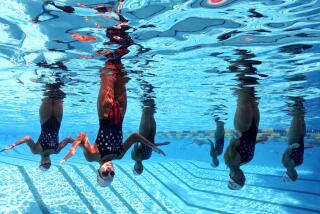It’s All Business When Ross Gets Down to Playing : Volleyball: Senior-to-be at San Diego State stands tall for the East team at the Olympic Festival.
Hours before his second U.S. Olympic Festival match, San Diego State’s John Ross had talked enough volleyball that he needed to wash it all down with an iced cappuccino.
“I don’t like coffee at all,” said Ross as the interview came to an end at Loyola Marymount, the festival’s volleyball venue. “But this stuff is great. They’re test marketing it right now to see if it’ll sell.”
Sounds like a real white wine-drinking, quiche-eating kind of guy, eh? Not by the longest stretch of the imagination. Besides, he couldn’t legally drink until today--his 21st birthday.
Ross, a member of the East team that lost to the North, 15-6, 15-13, 10-15, 13-15, 15-10, for the bronze medal Saturday night, grew up in parts of the San Fernando Valley where he saw enough gang violence, broken families and high school dropouts to know he wanted none of it.
“People around me were always fighting,” Ross said. “I didn’t want to get involved in any of it. I wanted more. All the violence, what good comes out of it? Nothing. People who glamorize gangs have never seen someone put a knife to their brother’s throat. I have. The reality is that will get you killed. I wanted to go to school, get my degree, play volleyball.”
As early as grade school, Ross went to work on a plan that would land him in college--a first in his immediate family. Neither parent or any of his three older brothers went to college, but his grandparents, with whom he lived from the time he was 7, graduated from UCLA. They introduced him to sports and the idea that he could make a difference.
“They were a big inspiration for me,” said Ross, a 6-foot-5 senior-to-be who, as a middle blocker, is one of the Aztecs’ two returning starters. “I always knew (college) was something I wanted to do and I knew we didn’t have the money to do it.”
Touted as more of a basketball talent, Ross defied his high school coach by playing and pursuing volleyball.
“I looked at it as a business deal,” said the 1988 Chatsworth High graduate. “I knew I wouldn’t get a basketball scholarship, there are just so many guys out there. But I knew there were a lot of volleyball teams and not so many players, and those scholarships had to go to someone.”
Sometimes, Ross sees high school students and feels as if though years completely passed him by.
“I see them and I think, ‘Man, I was never like that,’ ” he said. “I always hung out with older guys. I learned more from them.”
He concentrated on volleyball his junior and senior years, played on the beach until dusk during the summers and hoped he’d catch on fast enough to impress anyone in a position to offer him--in return for the services of his evolving skills--financial assistance.
A handful expressed interest, but SDSU Coach Jack Henn felt Ross would blend well with the Aztecs, who ultimately gave him the best offer.
“I noticed he was a real student of the game and real self-motivated,” said Henn, who in 1989 took over a program in transition. “I didn’t concern myself much with how much everyone else recruited him. I felt he could play here.”
Last year, the first time he was a day-in, day-out starter, Ross was third in the nation in hitting percentage and 12th in blocks per game. The Aztecs (22-7) ended the season ranked fifth in the nation--they got as high as third--and were booted from the national qualifying tournament by eventual NCAA champion Long Beach State.
“We started beating all these ranked teams from other conferences, and we still didn’t get any respect,” Ross said.
But Ross is starting to get his due. He was captain of the gold-medal winning South team in the festival in 1990. This year, in a more competitive atmosphere, he worked his way into another starting lineup.
“There are a lot of guys that aren’t here this year that were here last year,” he said. “The level has really raised. Just to start on any of these teams is tough.”
Henn said Ross’ knowledge of the game took a profound turn two years ago against Long Beach State.
“We were trying to figure out how better to attack them,” Henn said. “It used to be enough to put your best six out against their best six. We actually analyzed the team to see what would work best. A key thing for us was John coming up with the idea to put a big, slow guy on the outside and put himself and another quick guy in the middle. That gave us strength on the outside and allowed us a big guy in the face of their outside hitters all match.”
Although SDSU lost the fifth game 16-14, “it was a determining point for all the kids,” he said.
Respect for the SDSU’s men’s volleyball--the only SDSU sport to have won a national championship--has come equally slowly, which is a source of frustration for Henn, co-coach Mark Warner and the team. With the men’s and women’s national teams based in San Diego, it baffles Ross that the Aztecs aren’t taken more seriously.
“We’ve had good years, but we’ve never really gotten recognized,” said Ross, who has one remaining season to get the post-season recognition that has eluded him. “I don’t understand why. To overlook us is ridiculous.”
The best-case scenario would have the computer programming major graduate and get the nod for the national team.
“The first priority is the national team and playing for the red, white and blue,” Ross said. “I’ve always looked up to the guys on the team. They’re the best. Everyone knows who they are. If that doesn’t work out, I’ll pursue (professional leagues in) Europe or the beach. It would be great to make a living out of something I’ve put so many years of work and time into.”
In the first festival game, national Coach Fred Sturm was on hand to do some scouting. Ross was one of the players he watched. But it’s still to early to say whether he has the right stuff to make Sturm’s team.
“The best way to answer that is to say I’m not sure he can’t, “ said Sturm. “By that, I mean specifically, the most difficult thing to predict, for any player, is how much he’ll have to improve and adapt to a different kind of game. And the international game is different. Without seeing him playing every day, I can’t answer that.”
Sturm did say he’s seen Ross play a number of years and that he has “improved quite a bit. It’s a credit to him. He’s a fine player. He’s a good, effective blocker, a quick hitter and he has a good serve.”
His height--6-5 isn’t particularly tall for a middle blocker--gives him a distinct disadvantage.
“At the international level, guys in the same position are 6-10 and above,” Henn said. “That’s one of the reasons the national team is having some problems. The Soviets, the Argentines, the Italians, the French, they all have real big guys. We don’t have individuals that can match up.”
What Ross lacks in size he makes up for in speed and smarts.
“What helps is his ability to read defenses and his quickness,” Henn continued. “Some guys that are 6-8 and 6-9 are a lot slower. But John is able to move from defense to offense easily and that’s a key. And he’s a good problem solver. He sees situations develop and finds ways to get around them.”
But unlike many college and professional athletes who don’t want to be role models, Ross doesn’t find ways to avoid it, rather he welcomes it.
“I don’t want to be the one you see with my face plastered all over the 5 o’clock news because I was doing drugs,” he said. “I want to do things the right way.”
Apparently, he’s not just blowing hot air.
“He’s a good role model,” Henn said. “He has a good work ethic, playing and in practice. He takes care of business in the classroom, his social conduct sets a good example, and he’s will speak up to players that are doing things he thinks are detrimental to the team. He’s a focused kind of person, a real likable guy. He parties with the guys, but in moderation. He’s seen first hand what extremes can do.”
More to Read
Go beyond the scoreboard
Get the latest on L.A.'s teams in the daily Sports Report newsletter.
You may occasionally receive promotional content from the Los Angeles Times.





